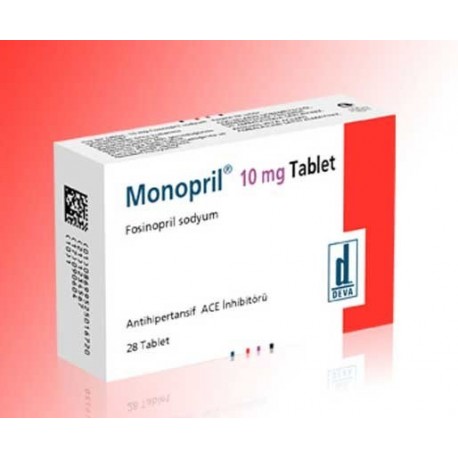 View larger
View larger Volume discounts
| Quantity | Discount | You Save |
|---|---|---|
| 2 | 5% | Up to $3.20 |
| 3 | 10% | Up to $9.60 |
| 4 | 15% | Up to $19.20 |
| 5 | 20% | Up to $32.00 |
More info
MONOPRIL Tablet is taken orally.
Active ingredient
10 mg fosinopril sodium in each tablet.
Excipients
Lactose, povidone K30, crospovidone, microcrystalline cellulose, sodium stearyl fumarate
1. What MONOPRIL is and what it is used for
• MONOPRIL belongs to a group of drugs called Angiotensin Converting Enzyme (ACE) inhibitors
• ACE inhibitors provide more comfortable blood flow by reducing the narrowing of blood vessels.
• MONOPRIL 10 mg Tablets are biconvex, round, notched on one side, white to off-white tablets with BMS/M10 written on both sides, each containing 10 mg fosinopril sodium as active ingredient.
• MONOPRIL 10 mg Tablet is available in 28 tablet forms.
• MONOPRIL belongs to a group of drugs called angiotensin converting enzyme inhibitors.
• MONOPRIL is used in the treatment of high blood pressure and heart failure.
2.How to use MONOPRIL?
Always use MONOPRIL exactly as your doctor has told you. Consult your doctor or pharmacist if you are unsure.
Instructions for proper use and dose/frequency of administration
• The usual dose of MONOPRIL is 10 mg once a day.
• Depending on your response to treatment, your doctor may decide that lower or higher doses, up to 40 mg per day, are necessary.
Application route and method
• Take the tablets with a sufficient amount (eg a glass) of water.
• You can take MONOPRIL tablets before or after meals.
different age groups
Use in children and adolescents (under 18 years):
Due to the lack of adequate studies, Monopril is not recommended for use in children and adolescents under 18 years of age.
Use in the elderly (65 years and older):
Use in the elderly
Special use cases
Renal impairment: Dosage adjustment of Monopril may be required in patients with severe renal impairment.
Hepatic impairment: Dosage adjustment of Monopril may be required in patients with hepatic impairment.
If you have the impression that the effect of MONOPRIL is too strong or weak, talk to your doctor or pharmacist.
If you use more MONOPRIL than you should
If you have used more than you should use from MONOPRIL, talk to a doctor or pharmacist.
If you forget to use MONOPRIL
If you forget to take Monopril when you should, ask your doctor when you can take your next dose.
Do not take a double dose to make up for forgotten doses.
Effects that may occur at the end of treatment with MONOPRIL
Your doctor will tell you how long your treatment with MONOPRIL will last. Even if you feel well, do not stop the treatment early without consulting your doctor.
If you have any further questions on the use of this medicine, consult your doctor or pharmacist.
3. What are the possible side effects?
Like all medicines, there may be side effects in people who are sensitive to the substances in the content of MONOPRIL.
If any of the following occur, stop using MONOPRIL and IMMEDIATELY inform your doctor or go to the nearest hospital emergency department:
• Itching, rash,
• Flushing,
• Swelling in the tongue,
• Shortness of breath.
These are all very serious side effects.
If you have any of these, you have a serious allergy to MONOPRIL. You may need emergency medical attention or hospitalization.
All of these very serious side effects are very rare.
If you notice any of the following, tell your doctor immediately or go to the nearest hospital emergency department:
• Problems with your heart and veins; for example, rhythm disturbances, palpitations, your heart beating normally fast, heart attack, high or low blood pressure, fainting, swelling in hands and feet,
• Severe joint pain (gout),
• Bleeding, jaundice,
• Respiratory distress, hoarseness, nosebleeds,
• Problems with your kidneys,
• Changes in your blood values and liver function tests, These are all serious side effects. Emergency medical attention may be required.
Serious side effects are very rare.
Tell your doctor if you notice any of the following:
Common >1% and <10% (less than 1 in 10 but more than 1 in 100) Fatigue, chest pain, oedema, infection, pain, nausea, vomiting, diarrhoea, heartburn, myalgia, weakness, headache, dizziness, mood change (nervousness, stress), tenderness, sleep disturbances, Cough, flu-like symptoms (upper respiratory tract infection, laryngitis, sinusitis, bronchitis), runny nose, visual disturbances, altered taste, abnormal urination , sexual incompetence.
• Uncommon 0.1% to 1% (less than 1 in 100 but more than 1 in 1000): malaise, fever.
• Side effects whose incidence cannot be estimated from the available data: Tinnitus, earache, mouth sores, abdominal swelling, change in appetite/weight, bloating, dry mouth, constipation, balance disorder, memory impairment, drowsiness, depression, behavioral changes

